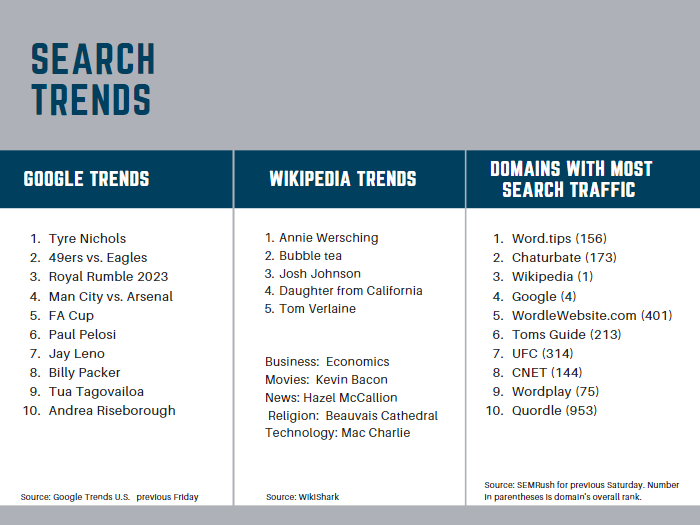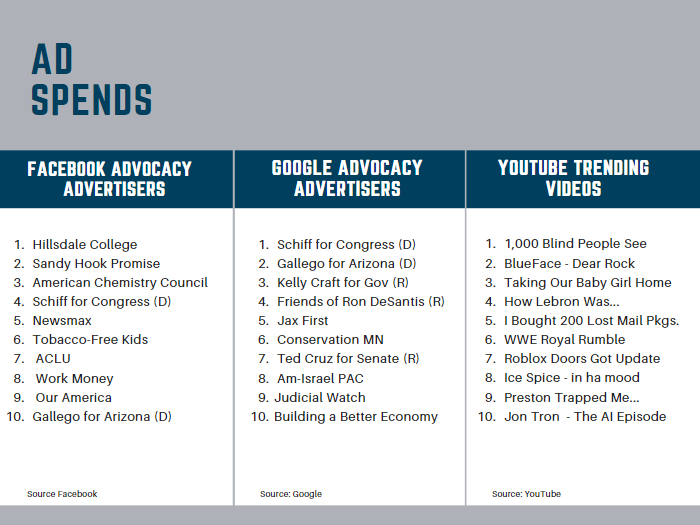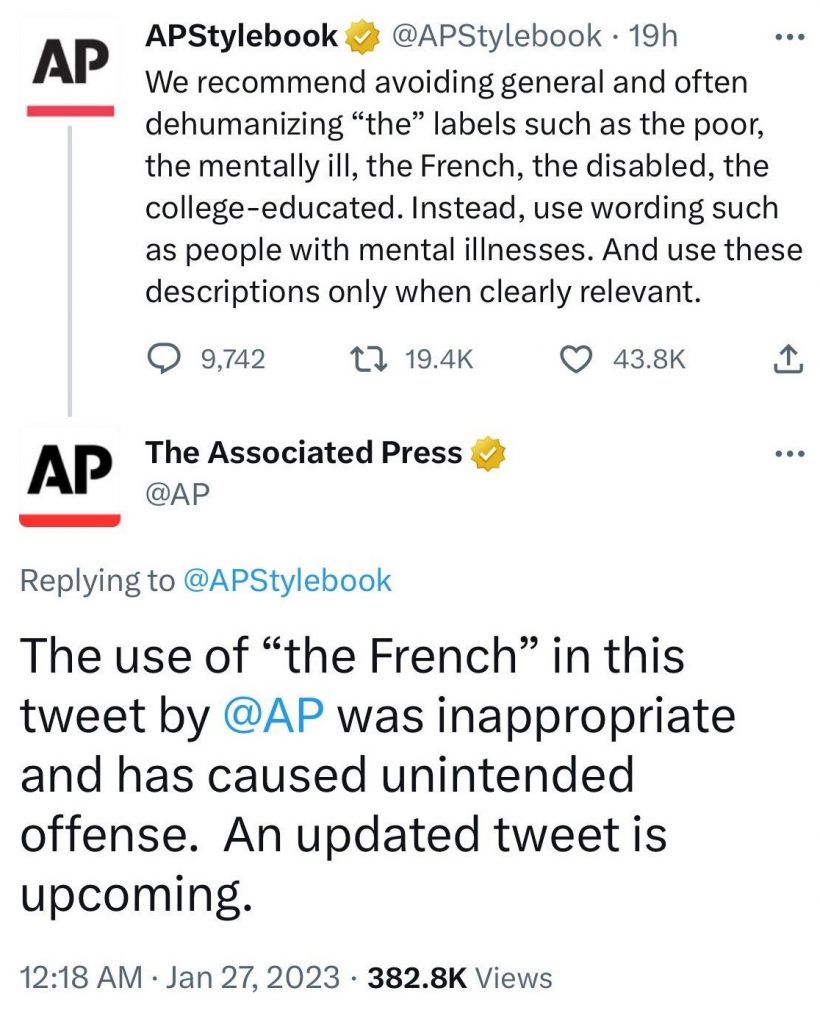Creatives are finding music streaming pays much less. Many are cashing out. Others are changing, but making less.


Creatives are finding music streaming pays much less. Many are cashing out. Others are changing, but making less.

It’s January 30th. Microsoft reported lower quarterly income and only slightly higher revenue last week, a decidedly mixed bag for Wall Street. Facebook is up on Wednesday afternoon followed by Amazon, Google, and Apple on Thursday.
Today’s Spotlight is 903 words — about 4 minutes to read.
Personalized medicine is being driven by advances in 2023 health technology, such as miniature medical devices and machine learning algorithms.
We’ll see more medical care delivered at home and at work with wearables and portable devices, beyond the already exciting advances in heart rate monitoring and fall detection.
Starling and Withings are about to release devices to help physicians monitor patients with diabetes, kidney disease, or urinary tract infections. TechCrunch reported that Starling’s CEO estimates the annual market for urinalysis is $4.9 billion, and that doesn’t include lost patient time for driving to facilities. In a lifetime, 50-60% of women will suffer a UTI, with 0.5 UTIs per person per year.
French company Lifeaz has created a $1,000 defibrillator device intended for home use. The unit provides vocal instructions, increasing the likelihood that medical help will be provided quickly and effectively. According to the American Heart Association, the average survival rate for sudden cardiac arrest victims in the United States is only 7%. NIH says that more units can save thousands of lives each year.
Amazon’s retailing expertise will disrupt local pharmacies and clinics in 2023. Health care has long been an Amazon focus. One estimate suggests that Amazon’s health care segment could create $9.66 billion in revenue by 2027.
A new Amazon Clinic service launched two months ago in 32 states. This gives Amazon access to a wide range of customers, who can now access health care services without having to leave their homes. Physicians working for Amazon will treat 20 everyday medical issues remotely, including birth control, GERD, motion sickness, allergies, and UTIs.
Another new Amazon service, RxPass, offers Prime members discounts on generic medications. Pricing for the generic versions of well known medications is $5 per month and no shipping fee plus the cost of generics that often range from only a couple of dollars to $15 or $20.
Future advances in 2023 health technology include using a smartphone to guide ultrasounds with a gel dispenser hidden inside a smartphone attachment. ECG algorithms are being tested at the Mayo Clinic for widespread atrial fibrillation screening. Mayo is also improving detection models for abnormalities that can be detected by machines during eye exams and ultrasounds.
1) The Justice Department and eight states filed a lawsuit alleging that Google is abusing its position as a monopoly in the advertising technology industry. The suit seeks that Google divest itself of some ad tracking technologies. The U.S. government has sued Google over its business practices five times in three years.
2) LastPass has acknowledged that hackers now possess encrypted backups of customer login credentials. The company has had a number of past issues including a hacking incident in 2015 and vulnerabilities discovered in 2016, 2017, and 2019. A few weeks ago, we wrote extensively about the troubled service.
3) The developers of an AI-powered traffic court adviser shut down a test after multiple state bar officials threatened legal sanctions. DoNotPay CEO Joshua Browder planned to have the service used in a California traffic court, but was threatened with possible prosecution for various misdemeanors including unauthorized practice of law.


State legislators sometimes propose wacky laws. That happened when a group of Wyoming legislators introduced a bill this month to ban the sale of electric vehicles starting in 2035. The bill failed and is not law.
We told you last week about abuses in facial recognition. One petty case included MSG-owned Radio City Music Hall identifying a mother accompanying a Girl Scout field trip who also works at a law firm suing the company. The mother was blocked from attending the show, eliciting threats of another suit and a pledge by state officials to investigate the company’s liquor license.
Now MSG’s mercurial owner James Dolan is threatening to voluntarily ban beer sales and refer angry patrons to the state official’s contact info.
If you write on an electronic device, you must read every word of “Tab Is Not Indent...”
It’s called Magnetoactive liquid-solid phase transitional matter.
Go ahead and call it T-2. It’s so cool.
Creative coder Neal Agarwal is back with another brilliant project. He may hold the record for the most Coffee Break features ever. This time you can visit random Wonders of Street View, that amazing Google Maps feature.


It’s January 9th. A GoFundMe campaign launched two years ago by Damar Hamlin to fundraise for his community ballooned to nearly $9 million following his dramatic on-field cardiac arrest. Hamlin’s contract, like most in the NFL, is not guaranteed.
Spotlight is off next week to observe Rev. Martin Luther King, Jr. Day.Today’s Spotlight is 866 words — about 3minutes to read.
The LastPass hack we told you about last August was more severe than originally claimed, and some cybersecurity experts say that the company is improperly downplaying the risk.
LastPass now acknowledges that it was hacked in August and November. In late August, it reported that its code had been stolen, but that no customer action was required.
Another breach occurred in November. One month later, LastPass acknowledged the November hack used information from the August hack, but said “the majority of customers” still didn’t have to do anything. because customers who followed their “suggested” best practices would be fine.
Multiple security researchers disagree, stating that hackers can build profiles of individuals using LastPass user data and that passwords used on the service were not as secure as random passwords would be. Further, LastPass was not requiring passwords to follow the company’s password strength recommendations.
We stopped recommending and using LastPass in 2019 after its third security breach in four years. It was apparent that the company, acquired in 2015, was in trouble. The company acknowledged two subsequent vulnerabilities, one each in 2020 and 2021.
Researchers and competitors also question LastPass’ claim that guessing a master password would take millions of years. An 11-character password can be guessed in about 25 minutes if humans don’t use random characters and only use familiar words and acronyms, claims 1Password executive Jeffrey Goldberg.
Other voices:
“I would consider all those managed passwords compromised,” the NYT quotes one researcher as saying.
A senior engineer on Yahoo’s security team told Wired, “I used to support LastPass. I recommended it for years and defended it publicly in the media … But things change.”
Your next steps: Get a free BitWarden account or 1Password paid account. Your password manager should select and store your passwords. Use two-factor authentication everywhere possible in addition to a randomly generated password. Passkeys are coming, but they won’t available on every service and with every device.
Interested in passkeys? See our November 21 Spotlight.
1) Anker’s Eufy device unit continues to fight exposés in The Verge about misrepresentations regarding camera data. The Verge claims that Eufy deleted ten privacy promises on its website instead of answering questions about how security camera footage is stored.
2) German government officials met with Twitter owner Elon Musk last week regarding Twitter’s previous commitment to remove disinformation from its site. Twitter and other Big Tech companies must do so by mid-June to comply with new laws.
3) Big Tech companies continue to face action from regulatory authorities.
Epic Games – the Fortnite game developer agreed to pay $520 million in December to settle FTC complaints about child privacy requirements and tricking players into paying for upgrades.
Meta – agreed to pay $725 million to settle a lawsuit regarding illegal data sharing with Cambridge Analytica. Separately, Meta was fined $414 million by European regulators last week for allowing ads based upon user activity.
Amazon – avoided fines, but must comply with a seven year agreement governing how it interacts with third party sellers on the site to settle EU antitrust complaints.


An orange dot showing on the top right of an iPhone display indicates that a running application has microphone access, not that “someone is listening to you right now” as a viral post claims. Snopes explains the alarmist take on a nice privacy feature.
We wrote about ChatGPT before the holidays and have been having a blast testing it since then. Now there’s word that Microsoft is preparing to enhance its Bing search engine with the technology. Three years ago, Microsoft invested $1 billion in Open AI, the organization that created ChatGPT.
The best primer on how to start using 1Password was published by the New York Times last summer. There are screenshots, how-tos, and tips.
McDonald’s is testing a restaurant where ordering is done via kiosk or online and the food is served via robotics. The concept is only at one location near Fort Worth for now, and food continues to be prepared by humans.
Chrono Quest gives players three tries to place six historical events in chronological order. Like Wordle, everyone gets the same quiz, and unlike Wordle, streaks continue if you miss a day.
